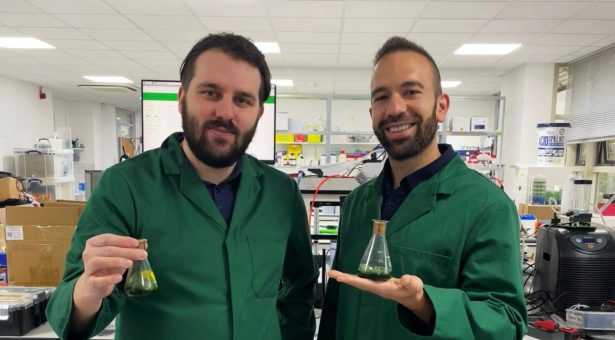Harry Steward’s experience with CyanoCapture working to answer the question, what if carbon capture became a byproduct of an already profitable process?

Harry Steward, a second-year student based at UEA completed his placement with CyanoCapture working on a project engineering fast-growing cyanobacteria for CO₂ fixation and expression of high value compounds. His duties and responsibilities included cloning of multiple constructs into cyanobacteria to improve conjugation efficiency and test inducible expression systems.
CyanoCapture is a biotech company that began at the University of Oxford in 2021 and is backed by the Elon Musk XPRIZE, Shell, L’Oréal and three climate-tech VCs in Denmark, US and Hong Kong. The company of 17 people is engineering photosynthetic bacteria that currently boast the fastest CO2 fixation rate known to develop a product that will radically reduce the cost of carbon capture, and the energetic penalty associated with performing any kind of CDR or CCUS. Their bolt-on technology captures and converts CO2 directly from emission stacks and can turn this into secreted recombinant proteins (some costing upwards of $100/gram) and the remainder of the biomass is pyrolyzed to make bio-graphite ($5600/ T).
Harry chose CyanoCapture as his placement host as he wanted experience in an industry start-up, collaborating with driven scientists, besides wanting to gain a further understanding in molecular biology.
Some of the new techniques Harry learnt included Gibson assembly, Golden gate cloning, site-directed mutagenesis, SnapGene in silico cloning and primer design which was both enjoyable and will be useful with his PhD projects. He enjoyed having time to read, discuss techniques with other members of staff and gain experience in the lab. He found it very collaborative, being able to ask the right person to solve an issue and being able to improve creativity in helping others with their issues as most of the research was exploratory.
Communication was one of the skills, Harry felt he developed the most as he worked with a diverse team of scientists – molecular biologists, protein scientists, strain optimisation scientists, bioinformaticians, engineers and market research experts along with the experienced biotech C-suite. Learning how the team supports each other was a massive learning experience for him. Harry presented in the monthly Research and Development meetings where everyone would give a 5-minute presentation and then take questions. He also gave a project presentation at the end of his project to update the molecular biologist team.
The placement project also helped Harry to development his organisation, research management and especially, independent and team working skills. He had free reign in managing and planning his placement project and appreciated the sanity checks with his supervisor for feedback on his plan. Harry was able to keep his workflow flexible meaning he could pivot to different areas of research depending on findings and changing priorities, completely different to his PhD research.
Jose Angel Moreno Cabezuelo, Harry’s supervisor at CyanoCapture said, “Harry has done an excellent job. He approached each task with professionalism, enthusiasm, and a strong work ethic. His contributions have had a real impact on our ongoing projects, and he integrated seamlessly into the team. He demonstrated significant growth in both technical and professional areas. He became increasingly confident in his ability to work independently, showed strong initiative, and refined his communication skills through regular team interactions and presentations. We’re very pleased with the outcome of his placement. “
Harry admits to having an amazing placement with CyanoCapture and highly recommends finding a medium sized start-up for students who have not yet organised their placements, as start-ups are small and agile with financing for consumables and other equipment. He said, “It can also give you amazing connections for after completion of your PhD. I recommend doing your placement in your second year as you will have gained enough skills to be competent with your host whilst also having enough time upon returning to implement anything you’ve leant into your own research.”
